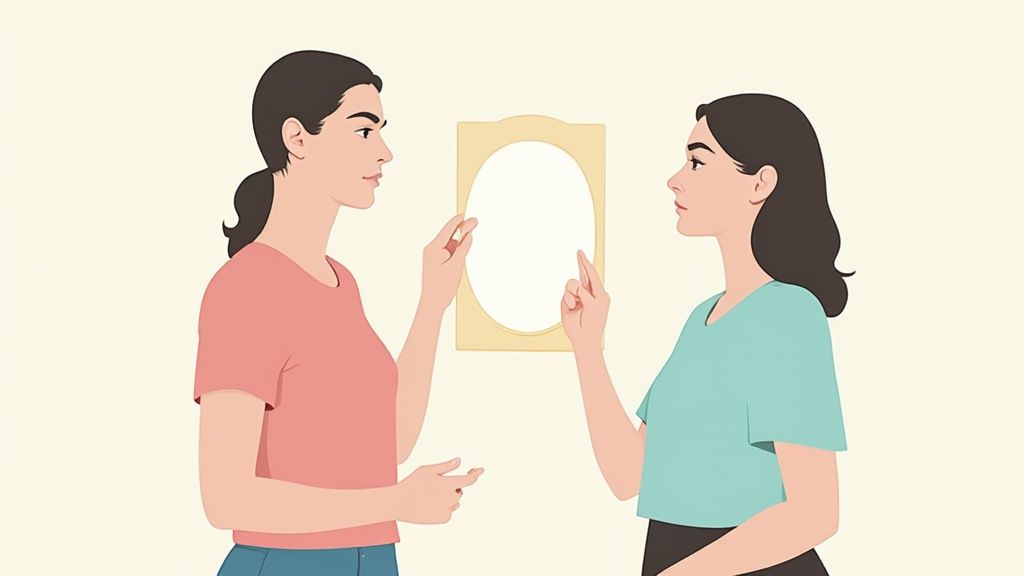A great B2B podcast isn't just about who you interview; it's about how you interview them. The right questions can transform a standard conversation into a masterclass in business strategy, leadership, and innovation. Asking generic, surface-level questions leads to forgettable content that fails to capture attention or drive results. To build authority and an engaged audience that translates into a healthy pipeline, you need to go deeper and craft a truly memorable dialogue.
This list provides foundational questions for podcasts designed to unlock authentic stories, contrarian insights, and actionable advice from your B2B guests. We'll explore why these questions work, how to use them effectively, and provide tips to help you move beyond a simple Q&A. These aren't just queries; they are keys to unlocking the wisdom your audience craves.
Beyond the basics, the true art of asking better questions lies in sparking deeper connections and fostering meaningful dialogue. Just as important for podcasts, crafting questions that move beyond superficial interactions is crucial for audience engagement and building a strong community. For a different perspective on this, exploring Top Community Circle Questions to Spark Deeper Connection can offer valuable insights. The goal is to make your guest feel comfortable while guiding them to share their most valuable, high-impact expertise.
1. What's your origin story?
More than just an icebreaker, asking a guest about their "origin story" is a strategic move to ground their professional expertise in a relatable human narrative. This foundational question shifts the conversation from a dry recitation of a bio to an engaging story, revealing the pivotal moments, challenges, and motivations that shaped who they are today. For a B2B audience, this provides crucial context, building trust and making the guest’s subsequent insights more memorable and impactful.

Popularized by iconic interviewers like Tim Ferriss and Marc Maron, this question uncovers the "why" behind the "what." It allows the audience to connect with the person behind the title, whether it’s a B2B tech CEO or a niche industry consultant. Exploring how a founder went from a garage startup to a media empire, for instance, provides both inspiration and a framework for their business philosophy. Learn more about how Pomp built his media empire on the back of his story on Fame.
How to Use This Question Effectively
To make this one of the best questions for podcasts, you must go beyond the surface. A great origin story sets the stage for the entire conversation.
- Do Your Homework: Arrive with 2-3 specific points from your guest’s background you find interesting, such as an early career change or a unique project. This shows you're prepared.
- Listen for Threads: Pay close attention to unexpected details or emotional turning points. These are the threads you can pull on later to connect their past experiences to their current strategies.
- Bridge to the Present: Actively link their story to the episode's main topic. For example: "It sounds like that early experience with a difficult client directly shaped your customer-centric approach today. Can you tell us more about that?"
2. What's the biggest mistake you've made, and what did you learn from it?
This question is a powerful tool for transforming a standard interview into a profoundly human and memorable conversation. By asking a guest to reflect on their failures, you invite vulnerability and authenticity, moving beyond polished success stories to the gritty reality of growth. For a B2B audience, hearing a respected leader discuss a significant misstep provides invaluable, hard-won lessons that are far more relatable and actionable than a simple list of accomplishments.

Popularized by thought leaders like Brené Brown and Reid Hoffman on his Masters of Scale podcast, this question reveals character and resilience. It demonstrates that setbacks are not endpoints but catalysts for innovation and strategic pivots. Hearing how a CEO navigated a failed product launch or a founder recovered from a poor hiring decision offers listeners a blueprint for their own challenges. Exploring these moments builds immense trust and positions the guest as a genuine, experienced guide. For a deeper dive into embracing these moments, check out our post on startup failures and the lessons they teach.
How to Use This Question Effectively
To make this one of the most impactful questions for podcasts, you must create an environment of psychological safety before asking it. This isn't a "gotcha" moment; it's an invitation to share wisdom.
- Build Rapport First: This question should never be your opener. Wait until you've established a comfortable and trusting dynamic with your guest before broaching a topic that requires vulnerability.
- Model Vulnerability: A great technique is to briefly share one of your own smaller professional mistakes first. This signals that it's a safe space to be open and that failure is a shared human experience.
- Focus on the Learning: Frame the question to emphasize the outcome. Instead of just asking "What's your biggest mistake?" add "...and what was the most important lesson you took away from it?" to guide the narrative toward growth.
3. If you could have dinner with anyone, dead or alive, who would it be and why?
This classic hypothetical question is a powerful tool for moving beyond a guest's professional persona to reveal their core values, inspirations, and intellectual curiosity. It serves as a creative icebreaker that doubles as a deep-dive mechanism. The answer illuminates what a guest finds truly important, whether it's innovation, leadership, or historical wisdom, providing the B2B audience with a richer understanding of the human driving the business.

Popularized by iconic interviewers like James Lipton on Inside the Actor's Studio and Larry King, this question strips away the prepared answers and encourages spontaneous, authentic reflection. A B2B founder choosing to have dinner with Steve Jobs might reveal a deep appreciation for product design and relentless innovation. Choosing a philosopher like Seneca could signal a leadership style grounded in Stoic principles. This choice provides a unique lens through which the audience can interpret the guest’s subsequent business advice and strategies.
How to Use This Question Effectively
To transform this from a simple party game into one of the best questions for podcasts, you need to probe the "why" behind their choice and link it back to your episode's themes.
- Ask Insightful Follow-Ups: Don't just accept the name. Ask, "What's the first question you would ask them?" or "What specific lesson from their life do you apply in your own work?"
- Connect to Their Career: Bridge their choice to their professional life. For instance: "It's fascinating you chose Leonardo da Vinci. Do you see a connection between his multidisciplinary approach and how you've built your company's diverse service offerings?"
- Encourage Deeper Storytelling: Use their answer as a launchpad for a personal anecdote. You could ask, "Has there been a time you've tried to emulate that person's thinking when facing a business challenge?" This connects their inspiration to actionable insights.
4. What advice would you give your younger self?
This question transitions the conversation from external achievements to internal wisdom, encouraging guests to distill their most profound lessons into actionable advice. It's a powerful tool for generating empathy and value, as it uncovers the guest's hard-won insights, regrets, and pivotal mindset shifts. For a B2B audience, this humanizes a guest beyond their corporate title, revealing the personal philosophy that drives their professional decisions and leadership style.

Popularized by luminaries like Oprah Winfrey and Tim Ferriss, this question effectively mines for gold by asking guests to reflect on their entire journey. The advice shared often becomes the most memorable and shareable clip of an episode, whether it’s Naval Ravikant discussing wealth principles or a B2B CEO explaining the importance of embracing failure early. This creates a moment of genuine connection, providing listeners with timeless wisdom they can apply to their own careers and lives.
How to Use This Question Effectively
To get a truly insightful answer, you need to guide the guest beyond a generic response. This is one of the best questions for podcasts when used to uncover a story.
- Prompt for Specifics: Instead of accepting a broad statement like "trust your gut," follow up by asking for a specific instance where they didn't trust their gut and what the outcome was. This turns abstract advice into a concrete lesson.
- Explore the "Why": Ask why this specific advice would have been so crucial for their younger self. What specific challenges or misconceptions were their younger self dealing with that this advice would have solved?
- Connect to the Audience: Frame the advice in the context of your listeners' challenges. For example: "That's powerful advice. For a founder listening right now who is facing a similar crossroads, how would they apply that lesson today?"
- Segment by Life Area: If the initial response is career-focused, gently probe for advice related to other areas like health, relationships, or personal finance. This provides a more holistic view of the guest. You can learn more about how to structure these follow-ups and how to prepare for a podcast interview to maximize impact.
5. What's a contrarian view you hold that most people disagree with?
This intellectual challenge separates a standard interview from a truly memorable one. Posing this question encourages guests to share unconventional wisdom and articulate views that challenge the status quo. For a B2B audience, this is invaluable, as it reveals a guest's unique problem-solving framework and critical thinking skills. It moves beyond generic business advice to uncover the specific, often unpopular, insights that drive real innovation.
Popularized by thought leaders like Peter Thiel and Naval Ravikant, this question is designed to generate highly thought-provoking content. It pushes guests to defend their reasoning, providing your listeners with a masterclass in first-principles thinking. Hearing a B2B SaaS founder explain why they believe a widely accepted marketing tactic is ineffective, for example, delivers far more value than simply rehashing common knowledge. Discover more powerful questions for podcasts and how to frame them in our guide to podcast interview questions.
How to Use This Question Effectively
To make this question land, you must create an environment where the guest feels safe to be truly honest. The goal is intellectual exploration, not a "gotcha" moment.
- Create a Safe Space: Frame the question with genuine curiosity. Phrases like "I'm interested in the ideas you've developed that might differ from the mainstream" can encourage openness.
- Ask for the 'Why': The contrarian view itself is just the starting point. The real value is in the reasoning behind it. Follow up with, "What experiences or data led you to that conclusion?"
- Explore the Implications: Once they've shared their view, explore its practical consequences. Ask, "How does holding this belief change the way you approach your business strategy or lead your team?" This connects their abstract idea to tangible business outcomes.
6. Walk me through your typical day or routine
This question moves beyond strategic theory and dives into the practical, daily execution of success. Asking a guest to walk through their typical day is a powerful way to reveal their productivity systems, prioritization frameworks, and the real-world habits behind their achievements. For a B2B audience, this offers a tangible look at how high-performers structure their time, providing actionable insights that listeners can apply to their own professional lives.
Popularized by interviewers like Tim Ferriss and Pat Flynn, this line of questioning satisfies audience curiosity about the "how" behind the "what." Hearing a B2B marketing leader detail how they block time for deep work, manage their inbox, or prepare for key meetings provides more practical value than a high-level strategic overview. It uncovers the discipline and systems that enable consistent high performance, making success feel more attainable.
How to Use This Question Effectively
To transform this from a simple curiosity into one of the most insightful questions for podcasts, you need to dig into the underlying principles of your guest's routine.
- Look for the 'Why': Don't just ask what they do; ask why they do it. "You mentioned you don't check emails until 10 AM. What's the strategic reasoning behind that decision?" This uncovers the philosophy behind the action.
- Explore Evolution: Ask how their routine has changed over time. Understanding what they've stopped doing can be just as valuable as learning what they currently do. This shows adaptability and learning.
- Connect to Outcomes: Tie their daily habits back to specific business results. For example: "How does your morning routine of reviewing key metrics directly impact the strategic decisions you make for the rest of the day?"
7. What's something you believed strongly in the past that you've completely changed your mind about?
This question is a powerful tool for revealing a guest's intellectual humility, capacity for growth, and adaptability. It moves beyond static expertise to explore the dynamic process of learning and evolving one's perspective. For a B2B audience, this demonstrates a leader’s ability to pivot, accept new data, and abandon outdated strategies, which are all hallmarks of effective leadership in a fast-changing market. It builds credibility by showcasing vulnerability and a commitment to truth over ego.
Popularized by thinkers and interviewers like Sam Harris and Julia Galef, this question uncovers the guest's mental operating system. It’s not about judging their past beliefs but understanding the journey of their intellectual development. Hearing a B2B founder explain why they abandoned a core belief about go-to-market strategy, for example, provides a masterclass in critical thinking and business agility. This is one of those insightful questions for podcasts that generates authentic, memorable moments that resonate deeply with listeners looking for genuine thought leadership.
How to Use This Question Effectively
To unlock the full potential of this question, the focus must be on the process of change, not just the before-and-after snapshot. It’s a chance to explore how your guest thinks.
- Create a Safe Space: Frame the question in a non-judgmental way. Emphasize that the goal is to understand their evolution of thought, not to scrutinize past views.
- Probe the "How" and "Why": The most valuable insight isn't just what they changed their mind about, but how. Ask follow-ups like, "What specific evidence or experience was the catalyst for that change?" or "How did you process that new information when it conflicted with your long-held belief?"
- Connect to Current Philosophy: Link their story of intellectual change to their current approach. You might ask, "How has that experience shaped how you evaluate new ideas or strategies in your business today?" This ties their personal growth directly to their professional expertise.
8. What question do you wish more people would ask you?
This meta-question is a powerful tool for handing the conversational reins to your guest, inviting them to steer the interview toward what they find most meaningful. It’s a sign of respect that signals you’re interested in more than just their prepared talking points. For a B2B audience, this question can unlock a treasure trove of hidden insights, revealing the specific topics, niche expertise, or contrarian viewpoints a guest is truly passionate about but rarely gets to discuss.
Popularized by masterful interviewers like Krista Tippett and Terry Gross, this question elegantly bypasses the standard interview script. Instead of guessing what’s important, you give your guest permission to highlight what they believe is underexplored. An entrepreneur might pivot from their success story to discuss the critical lessons from a failed venture, or a technical founder might finally get to explain the philosophical "why" behind their product's architecture. This makes for uniquely compelling and memorable content.
How to Use This Question Effectively
Deploying this question at the right moment can transform a good interview into a great one. It's one of the best questions for podcasts because it reveals a guest’s core motivations and expertise.
- Time it Strategically: This question works best in the second half of the interview, after you’ve established rapport and covered the essential topics. It serves as a fantastic transition into deeper, more personal territory.
- Be Ready to Improvise: Your guest could take the conversation in an entirely unexpected direction. Be an active listener, ready to ask intelligent follow-up questions about their chosen topic, no matter how unfamiliar it is to you.
- Balance Agendas: While this question gives the guest control, your role is to ensure their answer remains relevant and valuable to your audience. Gently guide the conversation to connect their passion back to the overarching themes of your episode. For instance: "That’s a fascinating perspective on failure. How can our listeners apply that lesson when launching their next marketing campaign?"
- Leverage the Answer: The insights gained from this question are often pure gold for post-show content. Learn more about turning these moments into impactful assets with these 10 ideas on what to do after the podcast interview.
Podcast Question Themes Comparison

Turning Great Questions into a Growth Engine
You now have a strategic arsenal of questions for podcasts designed to do more than just fill airtime. They are engineered to extract compelling stories, reveal authentic personality, and unearth unique B2B insights. From uncovering a guest's origin story to challenging them with contrarian viewpoints, each question is a key that unlocks a different part of their expertise and experience.
The power of these questions lies not in asking them verbatim but in adapting them to create genuine, flowing conversations. As our founder, Tom Hunt, often emphasizes, the goal is to "let the conversation breathe" to uncover unexpected insights. The aim is to move beyond a simple Q&A format and foster an environment where guests feel comfortable sharing the kind of unscripted wisdom that listeners can't find anywhere else. This approach transforms your podcast from a simple interview into a memorable thought leadership platform.
From Insightful Conversation to Strategic Asset
However, capturing these brilliant moments is only half the battle. The true ROI comes from what you do after you hit "stop recording." To effectively turn great questions into a powerful growth engine, it's crucial to integrate them into a broader strategy following B2B content marketing best practices. Each episode is a valuable content asset that needs to be amplified.
So, what are the benefits of investing in B2B podcast promotion? It's the difference between creating content that a few people hear and building a brand that an entire industry respects. It elevates your visibility, builds authority, and generates high-intent leads. Effective B2B podcast promotion strategies ensure your hard-earned insights reach your ideal customer profile, drive qualified traffic, and build your sales pipeline. Podcast marketing services help in audience growth by systematically distributing your content across multiple channels, turning a single episode into a multifaceted marketing campaign. For B2B startups, comprehensive podcast marketing services provide the expertise and resources to compete with established players, offering packages that typically include production, guest outreach, social media promotion, and performance analytics.
Here are actionable next steps to turn your podcast interviews into a growth engine:
- Repurpose Relentlessly: Don't let your episode die after its launch day. Turn key quotes and insights into audiograms and video clips for social media. Convert the main takeaways into a blog post or a thread on LinkedIn. This maximizes the reach of every single interview.
- Activate Your Guests: Your guests are your biggest promotional partner. Provide them with a "promo pack" containing pre-written social posts, custom graphics with their headshot and key quotes, and direct links to the episode. Make it incredibly easy for them to share the content with their network.
- Integrate into Other Channels: A podcast shouldn't exist in a silo. Options for promoting your corporate podcast are vast: promote new episodes through your company's email using a dedicated B2B email newsletter agency to drive listenership from a highly engaged audience. Feature episodes on relevant website pages and use them as valuable content in your sales team's outreach sequences. A B2B social media agency can also create a consistent content calendar to amplify your episodes across relevant platforms.
The True Value of Masterful Interviewing
Mastering the art of asking high-impact questions for podcasts and strategically promoting the answers is how you build a category-defining show. It positions your brand as a central hub for industry knowledge and a connector of influential voices. This authority-building process doesn't happen by accident; it’s the result of intentional preparation, thoughtful conversation, and relentless promotion. How can podcast marketing services boost our company's visibility? By ensuring your valuable content doesn't just sit on a hosting platform but actively reaches new, relevant audiences, building brand recognition and thought leadership with every listen.
By implementing these techniques, you're not just creating a podcast. You are building a powerful networking tool, a lead generation machine, and a cornerstone of your brand's authority. Keep refining your questions, listening intently to the answers, and amplifying the incredible content you create.
Ready to turn your podcast from a concept into a core component of your marketing strategy? Fame handles everything from guest booking and production to promotion, so you can focus on having great conversations. Let us build your authority-driving podcast for you. Learn more at Fame.

